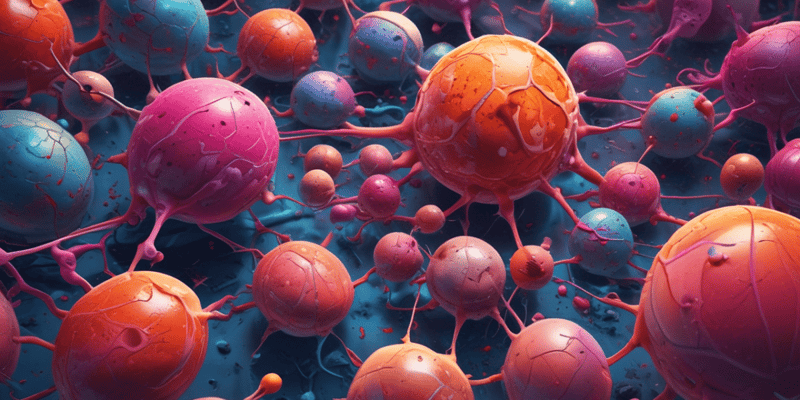6 Questions
What is the primary difference between necrosis and apoptosis?
The programming of the cell death process
Which of the following is NOT a cellular stress response?
Necrosis
What is the primary function of apoptosis?
To eliminate damaged or unwanted cells
What is a characteristic of cellular adaptation?
Permanent changes to maintain cellular function
What is the consequence of necrosis?
Tissue damage and organ dysfunction
What is an example of a cellular stress response?
Unfolded protein response
Study Notes
Cell Injury, Death, and Adaptation
Necrosis
- Definition: Unprogrammed cell death, often resulting from severe injury or inflammation
- Causes: Ischemia, infection, toxins, trauma, metabolic disorders
-
Characteristics:
- Cellular swelling
- Plasma membrane rupture
- Release of cellular contents
- Inflammation
- Tissue damage
- Consequences: Can lead to further tissue damage and organ dysfunction
Cellular Stress Responses
- Definition: Mechanisms that help cells cope with stress or injury
-
Types:
- Cellular repair: Reversible changes to restore cellular function
- Cellular adaptation: Permanent changes to maintain cellular function
- Cell death: Irreversible changes leading to cell death
-
Examples:
- Heat shock proteins (HSPs)
- Oxidative stress response
- Unfolded protein response (UPR)
- Autophagy
Apoptosis
- Definition: Programmed cell death, a controlled process of cellular self-destruction
- Causes: Genetic damage, DNA damage, growth factor withdrawal, immune response
-
Characteristics:
- Cellular shrinkage
- Chromatin condensation
- Nuclear fragmentation
- Membrane blebbing
- Phagocytic removal of apoptotic cells
-
Functions:
- Eliminate damaged or unwanted cells
- Maintain tissue homeostasis
- Regulate immune responses
- Prevent cancer development
Cell Injury and Death
- Necrosis: Unprogrammed cell death resulting from severe injury or inflammation, characterized by cellular swelling, plasma membrane rupture, and release of cellular contents, leading to inflammation and tissue damage.
- Causes of Necrosis: Ischemia, infection, toxins, trauma, and metabolic disorders.
Cellular Stress Responses
- Definition: Mechanisms that help cells cope with stress or injury, including cellular repair, cellular adaptation, and cell death.
-
Types of Cellular Stress Responses:
- Cellular Repair: Reversible changes to restore cellular function.
- Cellular Adaptation: Permanent changes to maintain cellular function.
- Cell Death: Irreversible changes leading to cell death.
-
Examples of Cellular Stress Responses:
- Heat Shock Proteins (HSPs): Protective proteins that help maintain protein function during stress.
- Oxidative Stress Response: Mechanisms that counteract oxidative damage to cells.
- Unfolded Protein Response (UPR): Response to misfolded proteins, helping to restore protein function.
- Autophagy: Process by which cells recycle damaged or dysfunctional components.
Apoptosis
- Definition: Programmed cell death, a controlled process of cellular self-destruction, characterized by cellular shrinkage, chromatin condensation, and nuclear fragmentation.
- Causes of Apoptosis: Genetic damage, DNA damage, growth factor withdrawal, and immune response.
-
Functions of Apoptosis:
- Eliminate Damaged or Unwanted Cells: Remove cells that are damaged or no longer needed.
- Maintain Tissue Homeostasis: Regulate cell numbers to maintain tissue health.
- Regulate Immune Responses: Involved in immune response and prevention of autoimmune diseases.
- Prevent Cancer Development: Eliminate cells that could become cancerous.
This quiz covers cell injury and death, including necrosis, cellular stress responses, and adaptation processes. Learn about the causes, characteristics, and consequences of cell injury and death.
Make Your Own Quizzes and Flashcards
Convert your notes into interactive study material.
Get started for free



